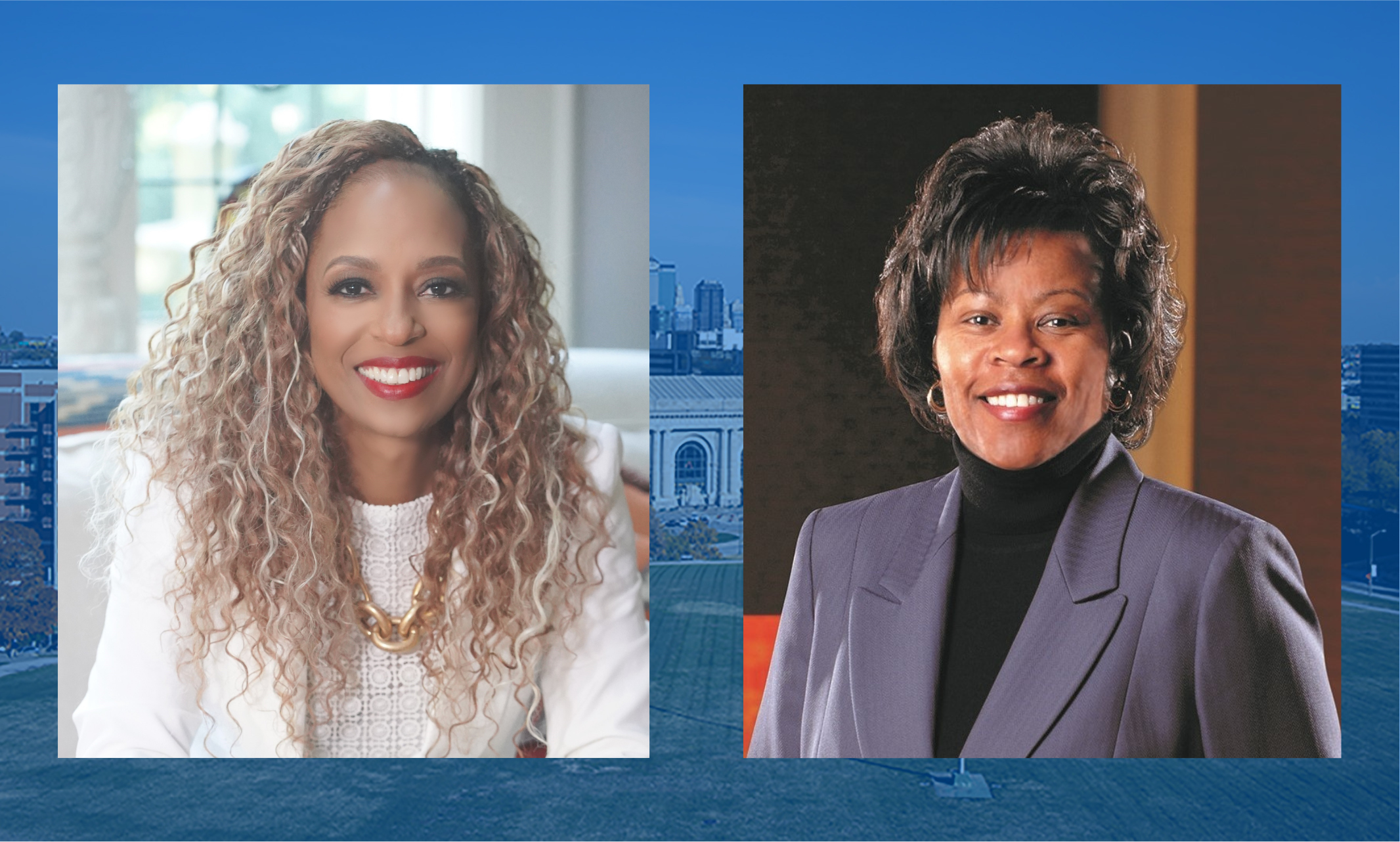
The bi-annual celebration is Feb. 20 at Kauffman Center; two notable Kansas Citians are event leaders
The University of Missouri- Kansas City Starr Women’s Hall of Fame is celebrating its 10th anniversary with an induction ceremony at 4 p.m. Feb. 20 at the Kauffman Center for the Performing Arts.
The Hall of Fame recognizes Kansas City women who have made the community a better place to live and preserves the history of their accomplishments. So far, more than 40 women have been inducted into the Hall of Fame, located at Miller Nichols Library at UMKC. Inductees, ranging from an architect, the only female mayor of Kansas City, nonprofit founders and beyond, are celebrated through video tributes, and some have donated their archives to the university library so future generations can study their inspirational contributions.
Inductees for the Class of 2025 Hall of Fame will be announced next month, and sponsorships and tickets will soon be available.
Two notable Kansas Citians will lead the 2025 Starr Women’s Hall of Fame induction ceremony: Michelle Wimes and Karen Daniel.The event chair is Wimes (B.A. ’88), senior vice president and chief equity and inclusion officer at Children’s Mercy. Since she joined the hospital, numerous articles about her leadership skills have been published in journals and magazines.
Wimes, a UMKC Trustee, is a nationally renowned thought leader on workplace inclusion. In 2024, she was one of 15 women nationwide to receive the Women Transforming Business Award in the area of community impact by CBIZ. In 2023, her alma mater, Tulane Law School, presented her with its inaugural Deans Kramer & Clayton Award for Leadership in Equity, Diversity and Inclusion. She was also recognized by Becker’s Hospital Review as one of the top chief diversity officers in hospitals and health systems to know in 2023. In 2021, the Kansas City Business Journal recognized her as one of 25 local “Women Who Mean Business.” She was co-chair of the 2023 Hall of Fame ceremony, and is excited to return to lead the event.
“Being surrounded by such amazing women is a thrilling experience,” Wimes said. “I am so grateful I get the opportunity to continue to take part in something so extraordinary.”
A Class of 2023 inductee, Daniel (M.S. ’81), is honorary chair. As the first independent African American woman to be a Major League Baseball owner since her addition to the Kansas City Royals ownership group in 2020, she embodies what it means to be a trailblazer.
“The Starr Women’s Hall of Fame’s meaningful message about recognizing women past and present who have broken barriers for the next generation is a powerful one,” Daniel said. “As an inductee, I feel honored to celebrate with a new class of inductees and congratulate them on their achievements.”
Daniel, a retired executive director, chief financial officer and division president of the Global Finance and Technology Solutions division at Black & Veatch, was also the first African American female to chair the Kansas City Chamber of Commerce. She created a legacy fund for scholarships to support Black college students and was named vice chair of the advisory council on Doing Business in Africa in 2015 by former President Barack Obama.
On top of it all, Daniel was announced as president of the KC2026 Board of Directors for the FIFA 2026 World Cup Games hosted in Kansas City.
Aug 29, 2024
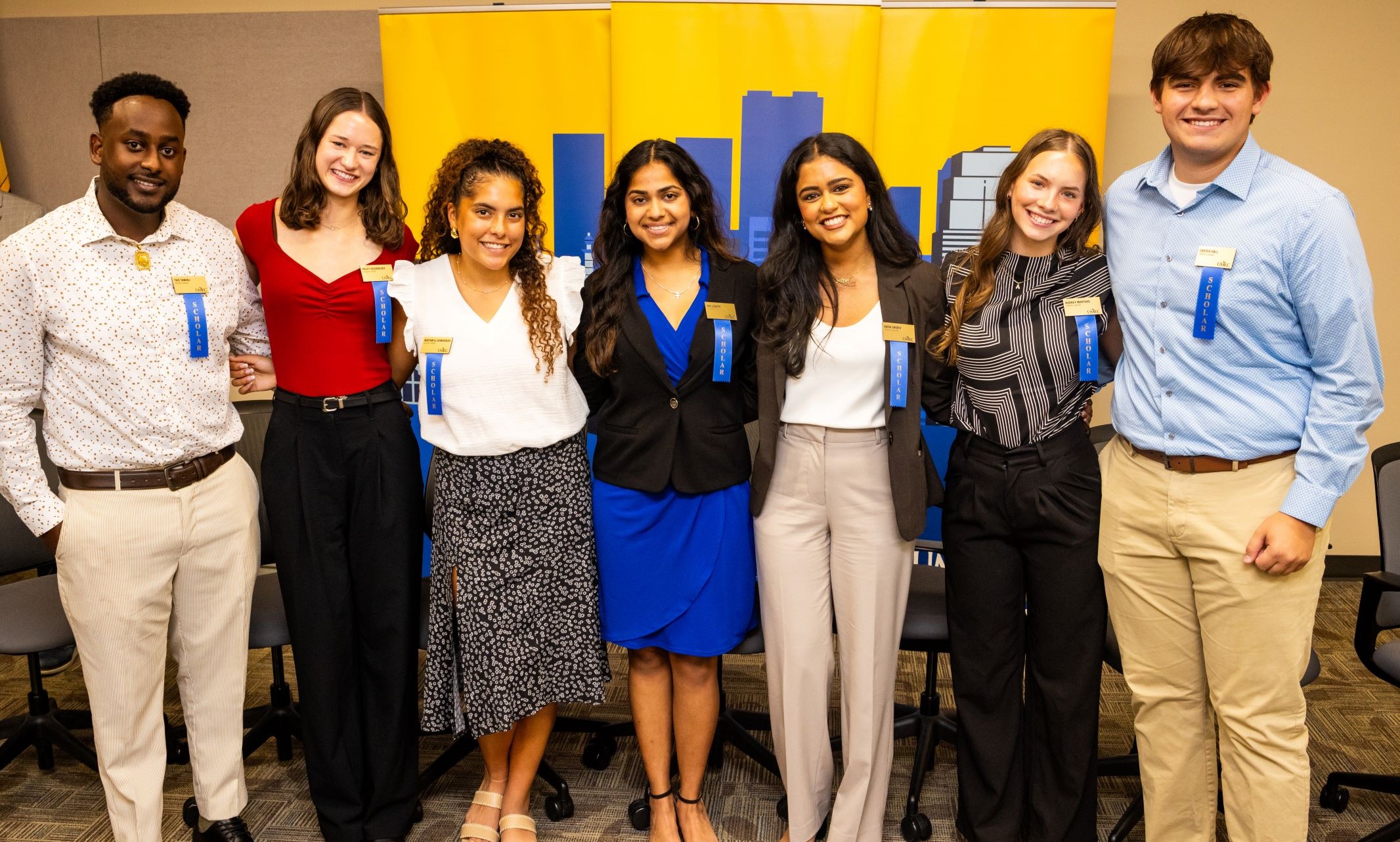
Seven outstanding students were chosen from more than 120 applicants
The University of Missouri-Kansas City welcomed the newest class of the Trustees’ Scholars at a reception on August 16.
The UMKC Trustees’ Scholars Program is a highly selective and prestigious scholarship for first-time students at UMKC. A collaboration between the university and the UMKC Trustees, the Trustees’ Scholar Program not only covers the majority of each scholar’s education but also provides access to the UMKC Trustees’ knowledge, connections and mentorship.
UMKC Trustees' Scholar Aaria Gandhi chatting with reception attendees.
UMKC Trustees Chair Doranne Hudson was unable to attend, so immediate past chair Debby Ballard welcomed the scholars and their families at the reception.
“The Trustees’ Scholar Program is a signature program at UMKC and is one of my favorite parts of being in the Trustees community,” Ballard said. “I think the program is always so inspiring. I gain so much from my mentees every year, and I keep saying it can’t get any better, but every year it does.”
UMKC Chancellor Mauli Agrawal congratulated the scholars.
“The Trustees won’t tell you this, but they are the ultimate group of people in Kansas City,” Agrawal said. “Most people don’t get access to the type of people they have access to. The relationships you build here will go beyond UMKC, so congratulations for being here."
UMKC Trustees' Scholar Haley Heidbreder having a conversation with immediate past chair Debby Ballard.
Suzanne Shank, chair of the Trustees’ Scholars Committee, shared insights.
“You are the best of the best,” Shank said. “We received over 120 applications this year, narrowed it to 25 to interview and selected the seven of you. Even if you have a Trustee mentor, there is nothing stopping you from reaching out to other Trustees for opportunities."
UMKC Provost Jennifer Lundgren welcomed the students.
“Being a Trustees’ Scholar is a rare and competitive opportunity,” Lundgren said. “Being a part of this exclusive cohort presents a lot of opportunities for your futures. At UMKC, we have very high standards for our students, and we do our best to make sure they are successful. So scholars, I encourage you to take advantage of your opportunity.”
Each scholar shared their story and their greatest accomplishments.
Maryam El-Demerdash
El-Demerdash is from Overland Park and is studying biology as a pre-dental student, with a minor in Spanish. El-Demerdash’s greatest accomplishment so far, juggling five varsity sports, community services and advanced courses in high school while graduating with a 4.0 GPA and receiving a Division I soccer offer to UMKC.
Aaria Gandhi
Gandhi is from Carol Stream, Illinois, and is studying health sciences. Gandhi hopes to become a nurse practitioner or a nurse anesthetist. Gandhi said UMKC already feels like home to her. She is most proud of getting her diploma in Indian classical dancing after learning for 12 years.
Carter Hall
Hall is from Washington, Missouri, and is studying biology as a pre-dental student. He is excited to be at UMKC for his undergraduate degree and hopes to attend the UMKC School of Dentistry.
Haley Heidbreder
Heidbreder is from Blue Springs and is studying business and minoring in Spanish. She said her greatest accomplishment is earning her seal of biliteracy for Spanish.
Ann Joseph
Joseph is from Chesterfield, Missouri, and is studying biology as a pre-dental student. Joseph said her biggest accomplishment was becoming a certified mental health first aider. She started the course as a fun thing with her friends, but it has become truly meaningful to her, and Joseph is excited to use and grow her skills.
Audrey Martens
Martens is from Nixa, Missouri, and is studying psychology. Her sister also attends UMKC as a dental student. Martens said her greatest accomplishment is working at Camp Barnabas this summer, giving joy and support to campers who have disabilities and chronic illnesses.
Tiko Tamiru
Tamiru is from Ethiopia and moved to Kansas City five years ago. He is trilingual and studying business administration. Tamiru is proud of how far he has grown and has brought his family’s pride with him. Tamiru is excited to be here, not just as a current achievement, but also for his future success.
Aug 28, 2024
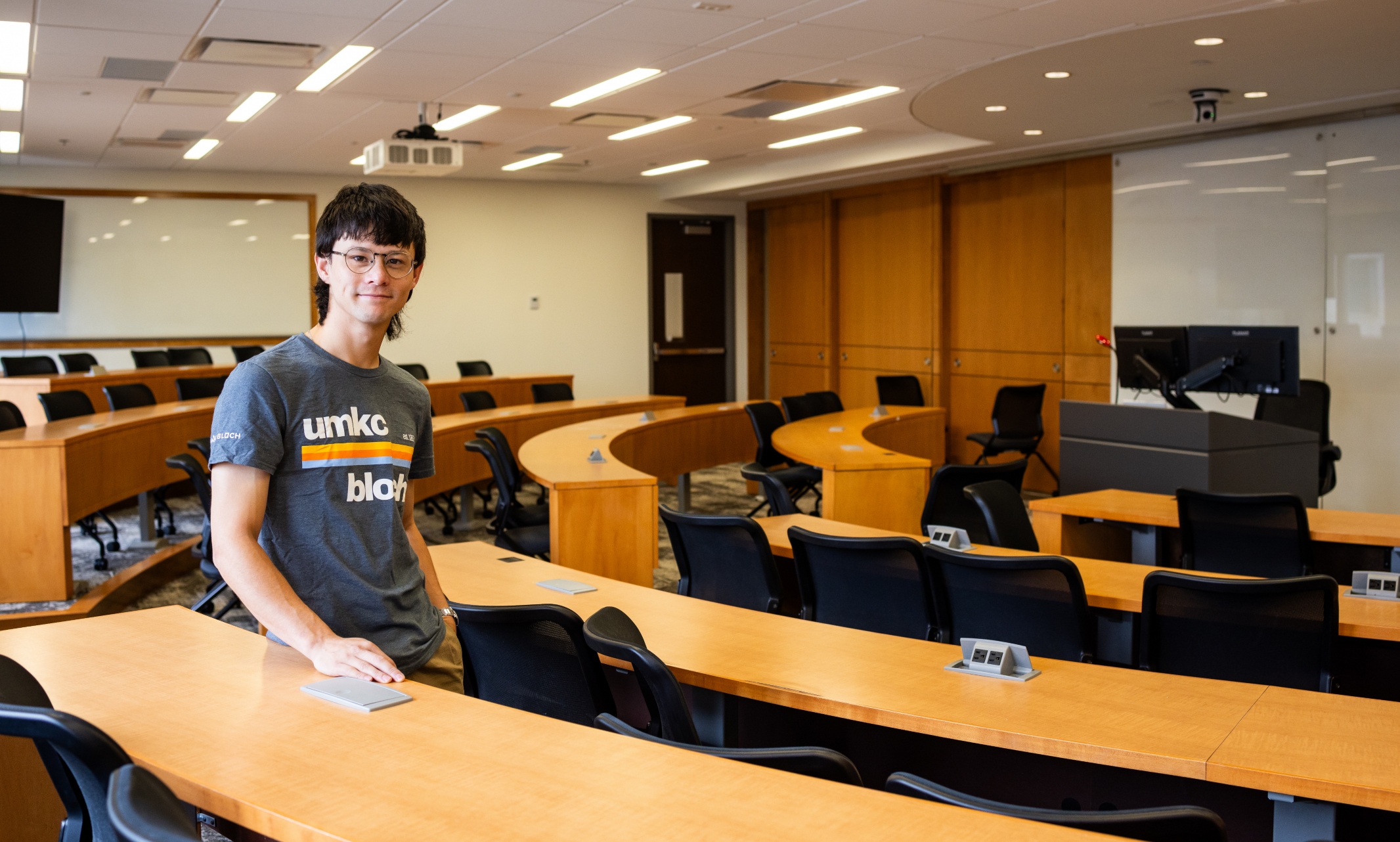
Ga Ji Wang is taking in the college experience and paying it forward
Ga Ji Wang had always wanted to go back to school. The business student had started college straight out of high school, but out-of-state tuition at his first institution meant that got put on hold.
He moved from Springfield, Missouri to Kansas City and started doing freelance photojournalism and working in the restaurant industry. When the pandemic hit, he decided to enroll at Johnson County Community College. Wang earned his associate’s degree and began working in the auto-repair industry, but realized there was a pay ceiling.That’s when he took to Google and stumbled upon the Missouri Fast Track Workforce Incentive grant, a program from the Missouri Department of Higher Education and Workforce Development that provides grants to assist with coursework tuition, general fees or direct costs.“I was kind of amazed, honestly, when I saw what it covered in terms of tuition,” Wang said. “I talked with my spouse about that possibility and what that would look like for us and applied.”After that, Wang said, coming to UMKC was an easy decision since he wanted to stay where he and his spouse lived, in Kansas City, and attend in-person courses, something he didn’t get to do during the pandemic while he was getting his associate’s degree. Going in person wasn’t the only difference for Wang.“There's a lot more clarity in terms of what I want out of my schooling,” Wang said. “I think there's a lot more intentionality in terms of my studies.” Wang committed to taking full advantage of his student experience. He sought out student organizations, serving as vice president of Baja SAE, a student engineering group that designs, builds and competitively. He also joined the student entrepreneurship group, Enactus, at the suggestion of one of his professors, Erin Blocher, who is the group’s faculty advisor. At first, Wang said he was a passive member of the group, but he started becoming more involved, even traveling with the group for the national Enactus conference in Texas.“That's when I really got committed to some more leadership roles and the following semester, I tried to help get some more projects going,” Wang said.
He found his prior work experience helped not just his schoolwork, but could also help others in ways he hadn’t imagined. During an Enactus site visit to Operation Breakthrough, he learned reliable transportation was a barrier to families in Kansas City getting to jobs and parenting duties, and he knew he could help. With the help of his Enactus team, Wang started Stay Driven, a car-care clinic to keep KC families on the road. “One of Ga Ji’s superpowers is his ability to listen with empathy and really hear others,” Blocher said. “Ga Ji naturally thinks through an innovative lens. He is a natural problem solver and, as a leader in Enactus, he helped the team look at needs in the community as entrepreneurs.”
Ga Ji Wang stands with his Enactus group during the Stay Driven event
Without his prior work experience, Wang said he may not have had the vision for Stay Driven.“Having done some of the work and been in the automotive industry, seeing what things are simple and what things we can manage, really helped give life to that project,” he said.Last summer, Wang interned with Spotlight AR, a connection he made at a career fair and through career and coffee events at the Henry W. Bloch School of Management. Without Fast Track, and the support of his spouse, Wang said, he may not have been able to come back to school for his undergraduate degree at all, let alone take advantage of all the opportunities that have enriched his experience.“A thing I think about a lot is it's crazy to have this opportunity,” Wang said. That’s why he’s committed to spreading the word and often shares about the program and his experience where he can to ensure that others are aware of the program. His advocacy has made a difference. Wang’s former co-worker, Charles McGraw, saw one of his social media posts and is now also excelling as a Fast Track student at UMKC.
Ga Ji Wang (left) helped inform his former work colleague, and now fellow Bloch student Charles McGraw (right) about the Fast Track grant.
With the knowledge and relationships he’s earned through his degree, Wang hopes to one day start his own business.“I don't think college is always a limiter, but I think now I know I can walk into a space and not have that be something that holds me back,” Wang said.
Aug 27, 2024
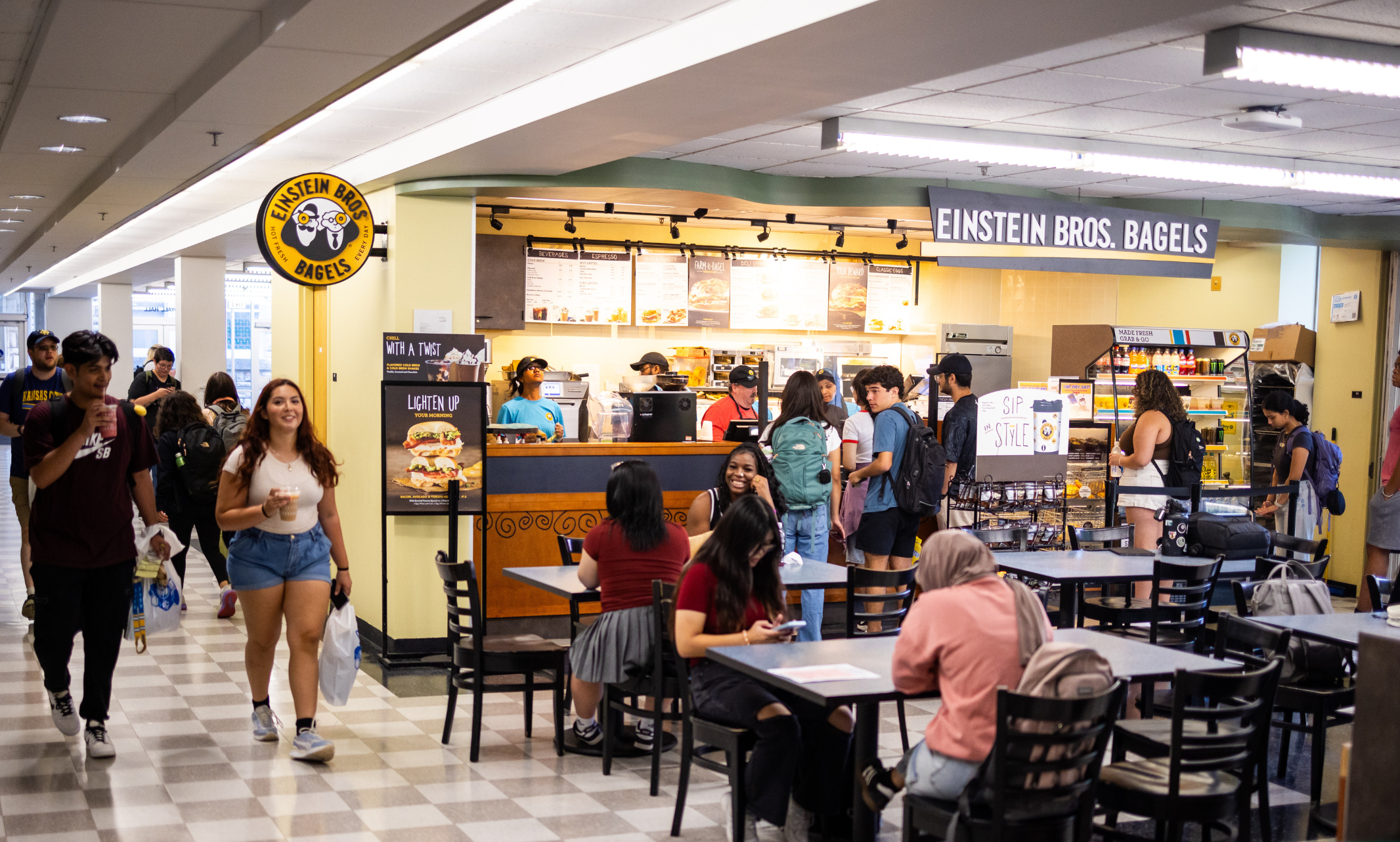
Both Volker and Health Sciences campuses provide plenty of options to keep you fueled
Can’t wait for the Foodiverse to open soon? Here are plenty of dining options (both on and off campus) to satisfy your hunger in the meantime.
Volker Campus
On-Campus
Dining Hall | Use your meal plan to enjoy rotating cuisine offerings.
Einstein Bros. Bagels| Known for their bagels and shmears, this spot also offers pre-made salads and cookies.
Robot Café | Located in the Miller Nichols Library, grab lattes, smoothies and sandwiches to-go.
Starbucks | Enjoy coffee and pastries at the full-service location.
Off-Campus
Blackhole Bakery | Indulge in classic French pastries and delicious mochi donuts.
Chipotle | The Mexican fast-food chain is known for its custom burritos, tacos and bowls.
Crow’s Coffee | The coffee spot is also perfect for studying.
Kin Lin | Both sit-down and take-out options are available at this Chinese restaurant.
Pizza 51 | Once a gas station, the restaurant now serves pizzas by the slice, calzones and sandwiches.
Tiki Taco | Just a short walk from campus awaits California-inspired Mexican fast food.
Whole Foods Market | The hot bar offers various types of cuisines.
Health Sciences Campus
On-Campus
Hospital Hill Café | Grab coffee and sandwiches in-between classes.
Subway | Create your own sandwiches, wraps and salads at this fast-food spot.
Off-Campus
Billie’s Grocery | Munch on organic plates and bakery items, including gluten-free options.
Brick House | Pair your food with a side of live music.
Orange By: Devoured |The newly open UMKC alum-owned business offers pizza and tapas.
Pilgrim Coffeehouse | The airstream trailer offers coffee and pastries.
Teocali | Enjoy authentic Mexican cuisine with patio-seating.
Aug 27, 2024
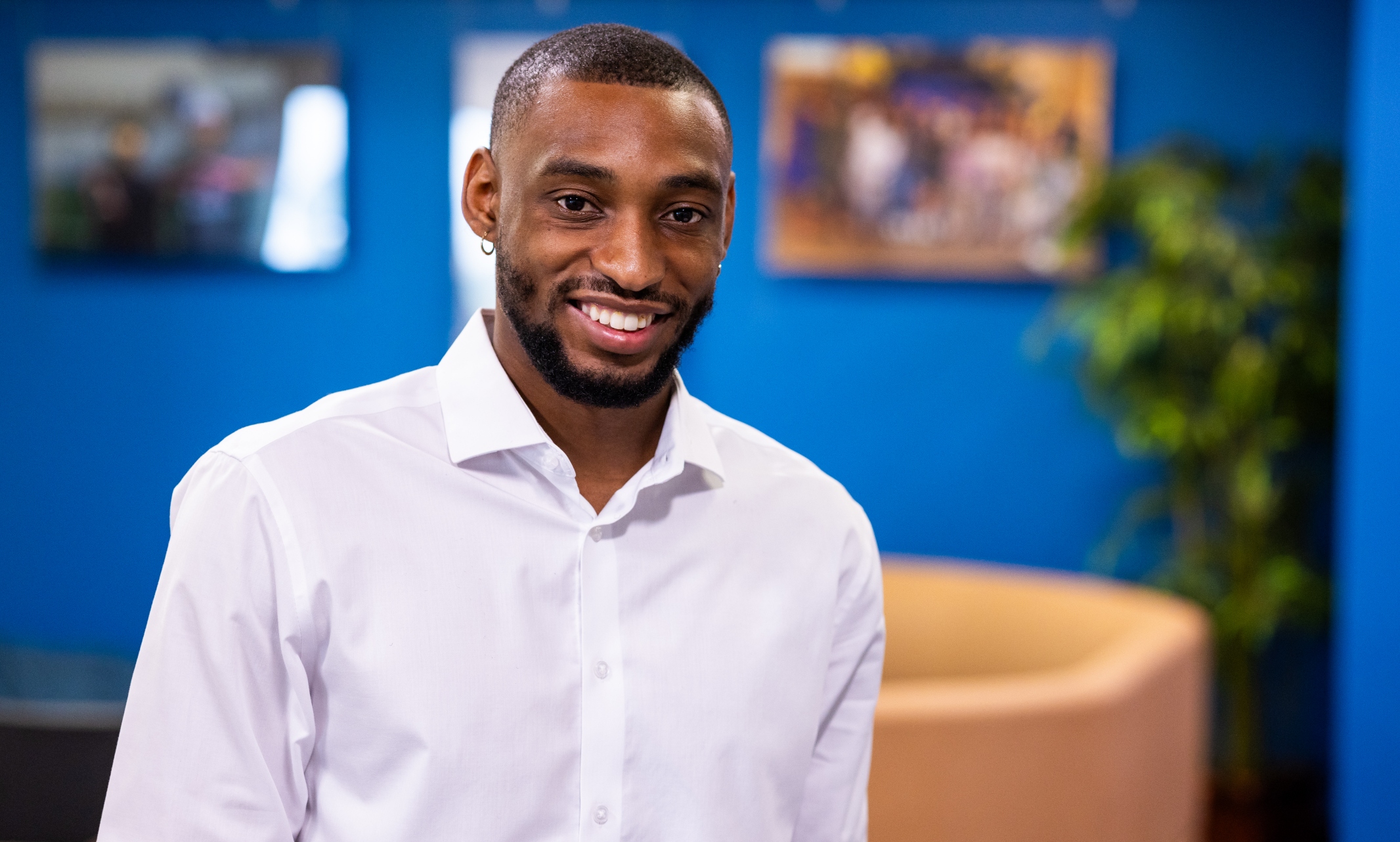
Aijalon Edwards says a sense of community kept him at UMKC and provided lifelong friendships
Aijalon Edwards knows exactly what he wants to do.
After serving four years in the United States Air Force, he knew that mental health resources were vital for veterans. He decided to pursue a degree in psychology to help veterans and the Black community.Edwards had heard from people who attended UMKC that it was culture-driven, which he valued. He also needed a program that was flexible because he was leading a security company and is a single father.At first, he struggled making the transition to school, and even considered dropping out, but then he learned what it meant to find his community here. Edwards met Roland A. Hemmings Jr. (B.A. ’05, M.A. ’12, Ed.D. ’21), the assistant director of Multicultural Student Affairs, during First Semester Experience.“He became a mentor to me,” Edwards said. “He informed me about the office when he saw I was struggling…He is the reason I have not given up; one of the biggest and most humbling relationships God has blessed me with since starting this journey at UMKC.”
Aijalon Edwards (right) met Roland Hemmings (left) through First Semester Experience
At Hemmings's suggestion, Edwards started getting involved in student organizations. He joined the African Americans Cultivating Excellence (AACE) mentoring program, which offers professional and peer mentoring, academic support, workshops and activities. He also joined the Men of Color Academy, a cohort program that promotes personal growth and prepares members for a successful transition into life after college. And he started accessing the services offered by the Office of Student Veteran Support Services, which helped him navigate his military educational benefits and provided social activities, even ones his kids could attend with him. For Edwards, his UMKC community changed his student experience.“Having people around you with the same goals and backgrounds can keep your head in the game and keep you from wanting to give up,” Edwards said. “Also, having so many different cultural outlooks or mindsets can better shape who you are as a person by giving you different perspectives.”
The programs and organizations Edwards joined also helped him learn how to navigate higher education, find resources and encouraged him to ask for help. At first, Edwards said, he was apprehensive to reach out to faculty because of his background.“I’m from the military, where you don’t talk above your rank,” he said. At the encouragement of people in his organizations, he talked with faculty and found they were understanding, approachable and helpful. “It took a lot of weight off my shoulders,” Edwards said. “The most common reason you'll hear for networking is all the opportunities it can provide…however, building relationships with people who have gone through similar struggles and successes can lead to strong and lasting connections, essentially becoming a second family, which, to me, matters much more.”While student organizations, and the community they provided, helped Edwards, Hemmings is the first to say that Edwards is the key to his own success. “Ultimately, AJ’s success is a reflection of his own dedication and hard work, and I'm simply here to help him realize what is already inside him,” Hemmings said. “AJ is a hardworking student, dedicated to making a difference in his family's life and studies. I’m impressed by his resilience in the face of challenges, and his ability to balance academics with all his other responsibilities.”Edwards says being a non-traditional student has its challenges, and he still sometimes finds it tough to summon all the energy it requires to manage school, a team at work and parenting, but the support he’s gained has helped him stay determined and give himself grace.“The best advice I could give anyone who wants to go back to school is, there is never a good time to go back,” Edwards said. “You have to force it to fit your agenda, and your path is never clear and sometimes life just gets in the way. Be thankful for what you can do and do not stress over the things not in your control. Humble yourself and accept that you’re amazing for walking this journey. It took me meeting a wonderful professor to realize that.”While there may be setbacks, Edwards said, that’s not always a bad thing. “Sometimes you may not realize it, but the rain helps. Hold your head straight. A brick a day will pave the way.”
Aug 27, 2024
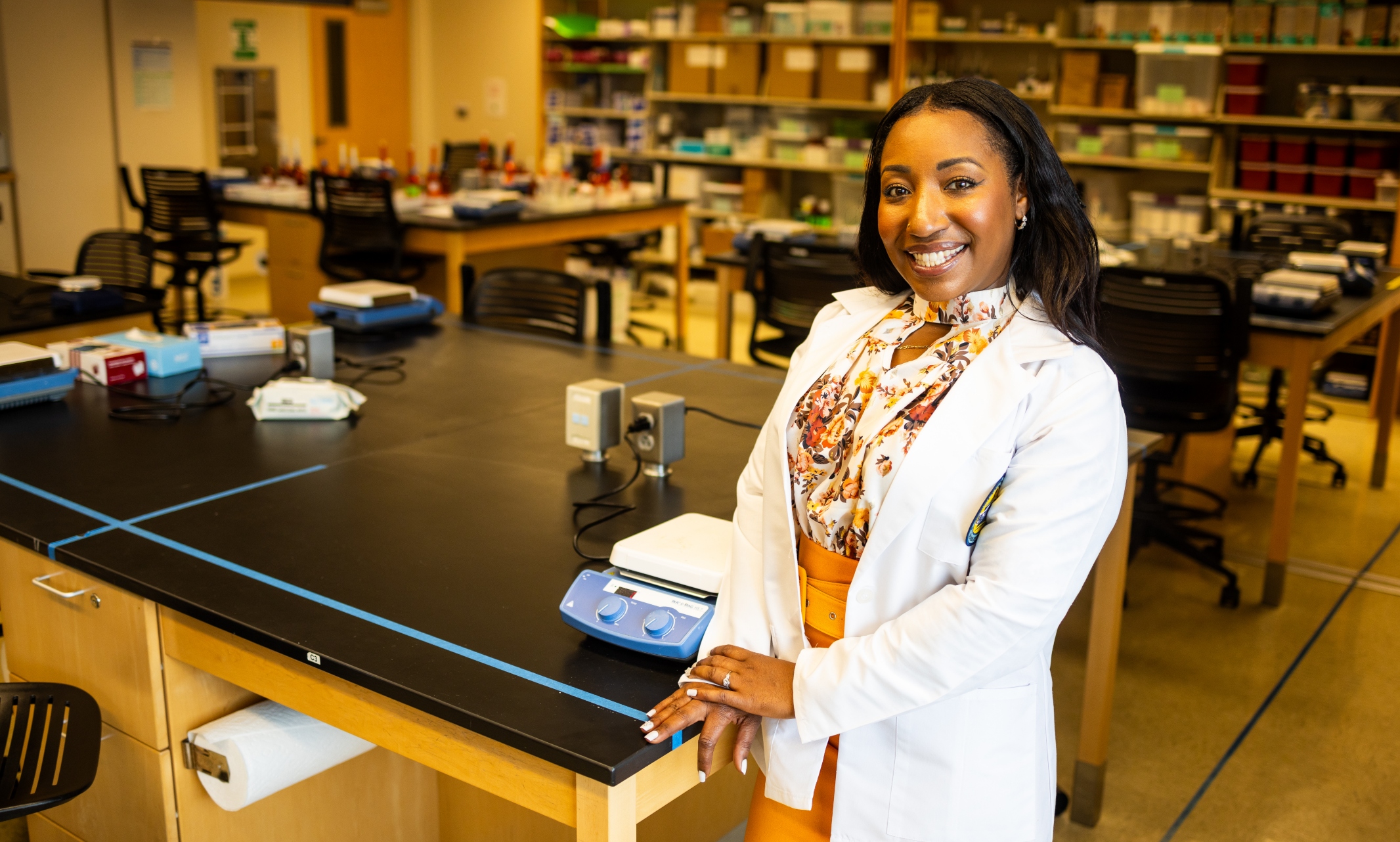
The KC Scholar is a mom of two, full-time employee and dual-degree student
Leresa Cozart has always loved to learn.
She earned her associate’s degree in mathematics from Houston Community College and started on a business degree, too. The mom of two got a job with CVS Caremark, helping people get their medications. One day, Cozart heard about KC Scholars on the radio. The program offers an adult learner scholarship that provides up to $50,000 for eligible adults who do not have a bachelor’s degree. Initially, she started pursuing a business degree, but switched to pharmacy to be in the healthcare field.Cozart’s son, MJ, was born with Duchenne muscular dystrophy and Cozart knew first-hand that if she became a pharmacist, she could help others in a different way. “I just wanted to be able to be on the front line to help people as opposed to having to call their insurance company,” she said.
Her first semester was a tough adjustment. She felt pressure to stick with a strict study schedule and was stressed about the workload, but she soon found an approach that worked better for her, taking her schoolwork day-by-day.“My spring semester, I kind of eased up on myself,” she said. “I've learned to not be so hard on myself and to be kind to myself, knowing that this is all new for me and there's going to be ups and downs.”Her love for learning, and knack for business didn’t end there. Cozart enrolled in the UMKC Master’s of Business Administration program to finish her business degree and will start MBA courses, along with her pharmacy courses, in Fall 2024.“I'm really just moving by faith and not by sight at this point,” she said. “I don't know what God has in store for me. I know that I don't write my story. I'm just going according to His plan.”
Managing two graduate programs, full-time work and motherhood is a balancing act, but Cozart says with some determination, there’s nothing that can’t be done.“If I can do it, anyone can do it, given everything I have on my plate,” Cozart said. “So I think it's doable and pharmacy is a good profession if you want to help people and you want a high-paying job that doesn't require the residencies of doctors.”Cozart said working remotely has helped make pursuing her degrees possible because it allows her to spend time with MJ and her daughter, Mariah, who have enjoyed seeing their mom become a student. “It makes me feel proud of her,” MJ said. “And it also shows me that regardless of age, regardless of what stage you are in life, it’s never too late to do what you want to do.”
For MJ, a junior in high school, having a parent who can relate to school-related challenges helps keep him motivated.“I feel as compared to most parent-kid relationships, where the parent just doesn't know what the kid’s going through with school and everything, having a mom in school makes me feel better about asking for help, and she helps me better because we're both going through kind of similar experiences,” he said.Showing her kids what is possible is part of what motivates Cozart to keep going during challenging times. “I definitely do everything I can to try to be the best role model for my kids,” Cozart said. “I want them to know that the opportunities are endless.”
Aug 26, 2024
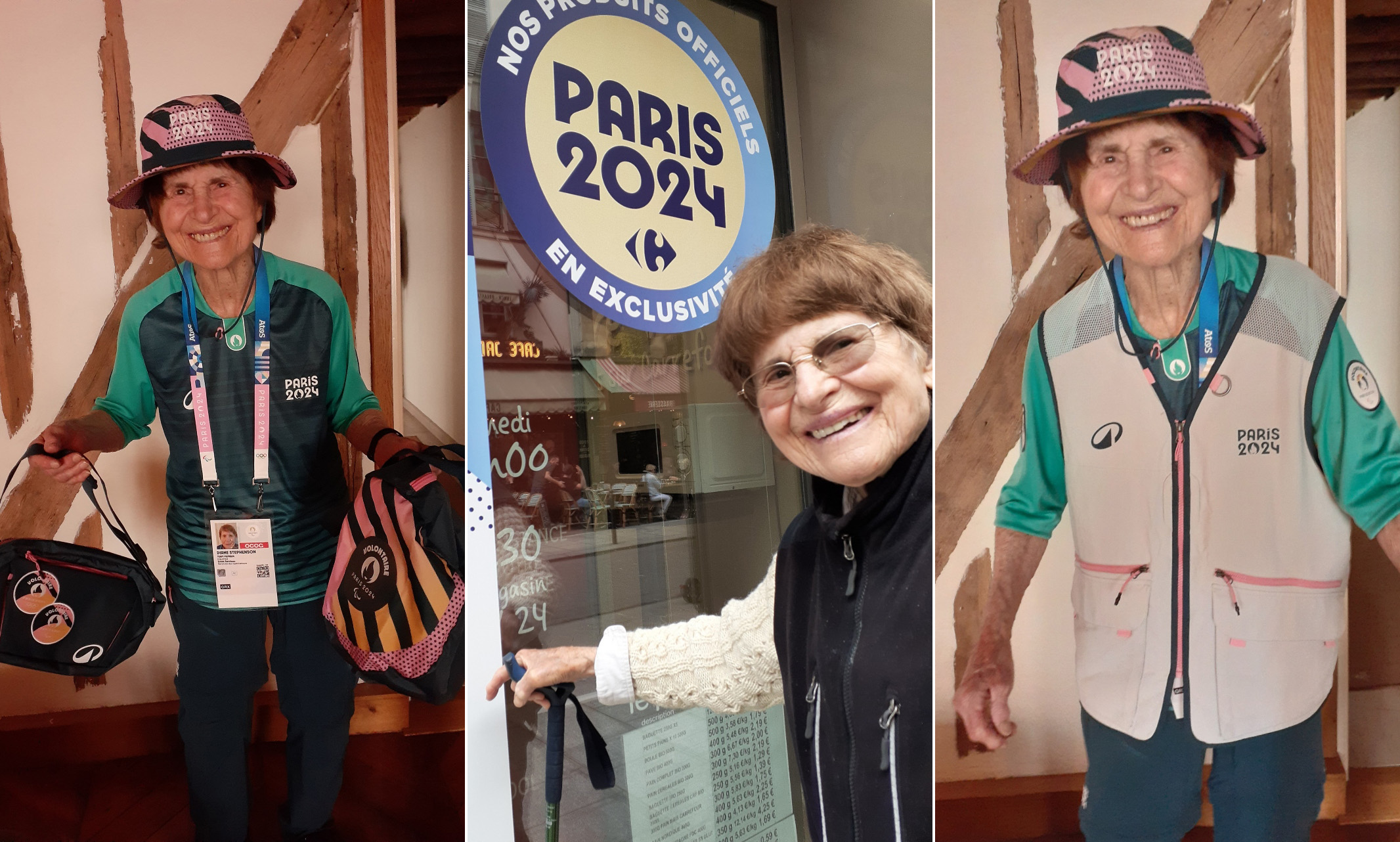
Diane Stephenson’s love of fencing has taken her around the world
A former UMKC physical education assistant professor has been selected as the oldest volunteer at this year’s Paralympic Games in Paris. At nearly 94, she’s the oldest in the Games’ 64-year history.
Diane Stephenson (M.A. ’67) will work alongside one of her former students, UMKC medical graduate, Sandra Katz (M.D. ’77) throughout the Games. Stephenson, great grandmother to 10 children, will be 94 in October. She coached fencing at UMKC for 14 years and was chosen among thousands of applicants from many different countries for the prestigious Games. “I feel honored, and immensely excited,” said Stephenson, who will perform a number of functions at the international fencing arena to help the competitions run smoothly. “To be a uniformed volunteer is a high point in my life, not just in my fencing career, but all the years I’ve spent in sports.”Stephenson was a tenured assistant professor in sports medicine and physiology of exercise and taught fencing beginning in 1966. She trained champion fencers and competed in tournaments in Chicago, New Orleans and Boulder, eventually earning 40 individual and team member trophies and medals. Among her students was Katz, a medical graduate of UMKC in ophthalmology. “I trained the champion of the Midwest back then and another one of my students was the first to become number one in two weapons, foil and épée, in the U.S. under-19 tournament, thus qualifying for the under-20 World Championship in Madrid,” Stephenson said. “My fencers became so renowned that when the Air Force Academy épée team was preparing for the Pan American Games, they came to Kansas City to train with my fencers and ended up winning first place after training with my team. Some members of my UMKC team are still fencing competitively all these years later.”“Diane fully deserves her selection, and we are proud to have her with us in Paris,” said a spokesperson for the Paralympics. “She has worked very hard in her life to help so many people develop a love of sports, particularly fencing, and we are sure such passion will be obvious during the Games.” “Rarely does a sport create such an inseparable bond for more than 50 years yet amazingly, even though at sword's point to each other, my group of fencers became the closest of friends, like family,” Stephenson said. “There were even several marriages among them.” To help make her training even more effective in Kansas City, Stephenson attended the 1968 Olympic Games in Mexico City to film specific fencing techniques to share with her students. “You can imagine how excited I am now about Paris and seeing the highest levels of the sport being played there,” she said.Stephenson, who also coached fencing at the University of Maine. She now lives in Tucson, but visits Kansas City regularly, joining her university fencing team for breakfasts. “Forty-two years ago, nine fencers had a photo taken at a team member's wedding,” she said. “Then 42 years later, at one of our reunions, we had a photo taken. The same nine fencers were there standing in the exact same positions.”
Aug 21, 2024
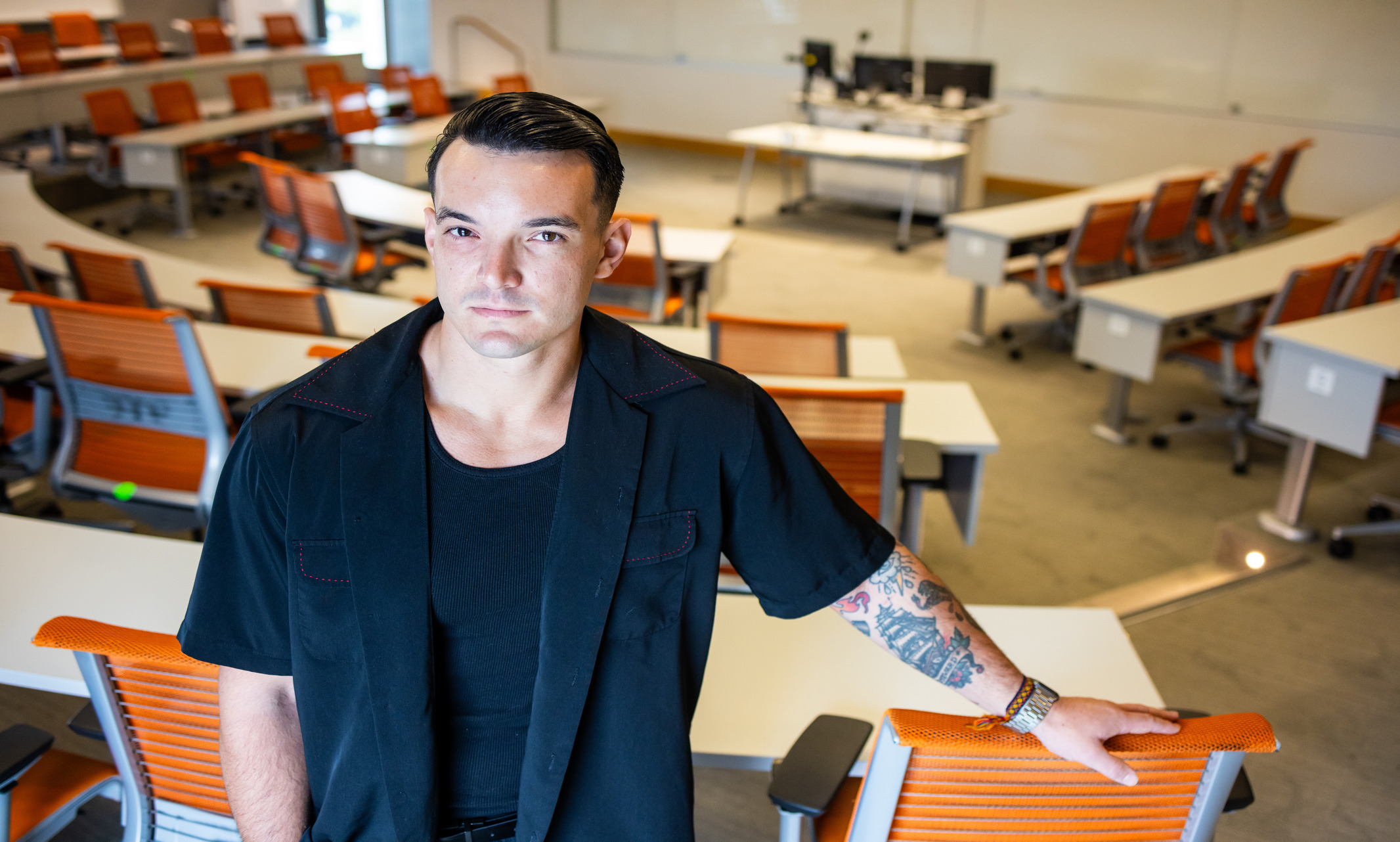
Charles McGraw knows the power of perseverance first-hand
There was a time when Charles McGraw didn’t think he’d ever graduate college, but now that dream is well within reach.
McGraw made several attempts at a bachelor’s degree throughout his early 20s while holding jobs in the restaurant industry, sales and marketing. Each time, he’d ended up dropping out. He’d been out of school for four or five years when he made a realization.
“If I was going to go any higher than I wanted to, I wouldn’t be able to do that without a degree,” McGraw said.
Charles McGraw (right) learned of Fast Track after seeing a social media post from his former co-worker, Ga Ji Wang (left).
He was scrolling social media one day and saw a former co-worker’s post about the Missouri Fast Track Workforce Incentive grant, a program from the Missouri Department of Higher Education and Workforce Development that provides grants to assist with coursework tuition, general fees or direct costs.
“I was like, ‘Well, now I don't really have an excuse not to go back to school and finish my degree,’” McGraw said.
This time, it was different. He enrolled in the Bachelor of Business Administration program with a renewed dedication to earn his degree.
“I'm not going to work this long for this and not try my best at it,” he said.
When he was younger, McGraw said, he was going to college because he felt it’s what he was supposed to do, but this time, he had a clear vision of what he wanted, which paid off both in his academic career and his confidence.
“Now I know what I want to do, and I'm focused and I'm here for me,” he said.
One course proved to be a particular hurdle for McGraw. He’d failed it before, but he wasn’t deterred. He dedicated time to attending three Supplemental Instruction sessions a week in addition to his class. SI is a UMKC-invented academic support program that provides optional additional instruction in difficult courses and has been used by universities around the globe.
The sessions allowed McGraw to revisit challenging topics and get support in a small setting rather than in a full class, where he wasn’t as comfortable asking questions. He ended up with an A in the course and made the dean’s list.
“If you ever have doubts about stuff that you think you can't do, you really can do it,” he said. “You just have to be willing to put in the effort and go the extra mile.”
Being a full-time student while working a full-time job has been challenging, but McGraw said it’s been worth it. “It keeps me busy and it keeps me on a schedule that I can maintain that helps me, I think, be successful in the long run,” he said. “You just have to make sure you get enough sleep, which is a big thing and it's definitely doable. You just have to prioritize.”
Now in his last year of college, McGraw is on track to earn his degree in Spring 2025. He plans to stay at his current job and knows that his degree will help him excel.
“It's just going to be a really big personal achievement because I didn't think I would ever actually graduate college,” he said. “I'm going to be happy to get it over with, but also very happy that I did it.”
Aug 19, 2024
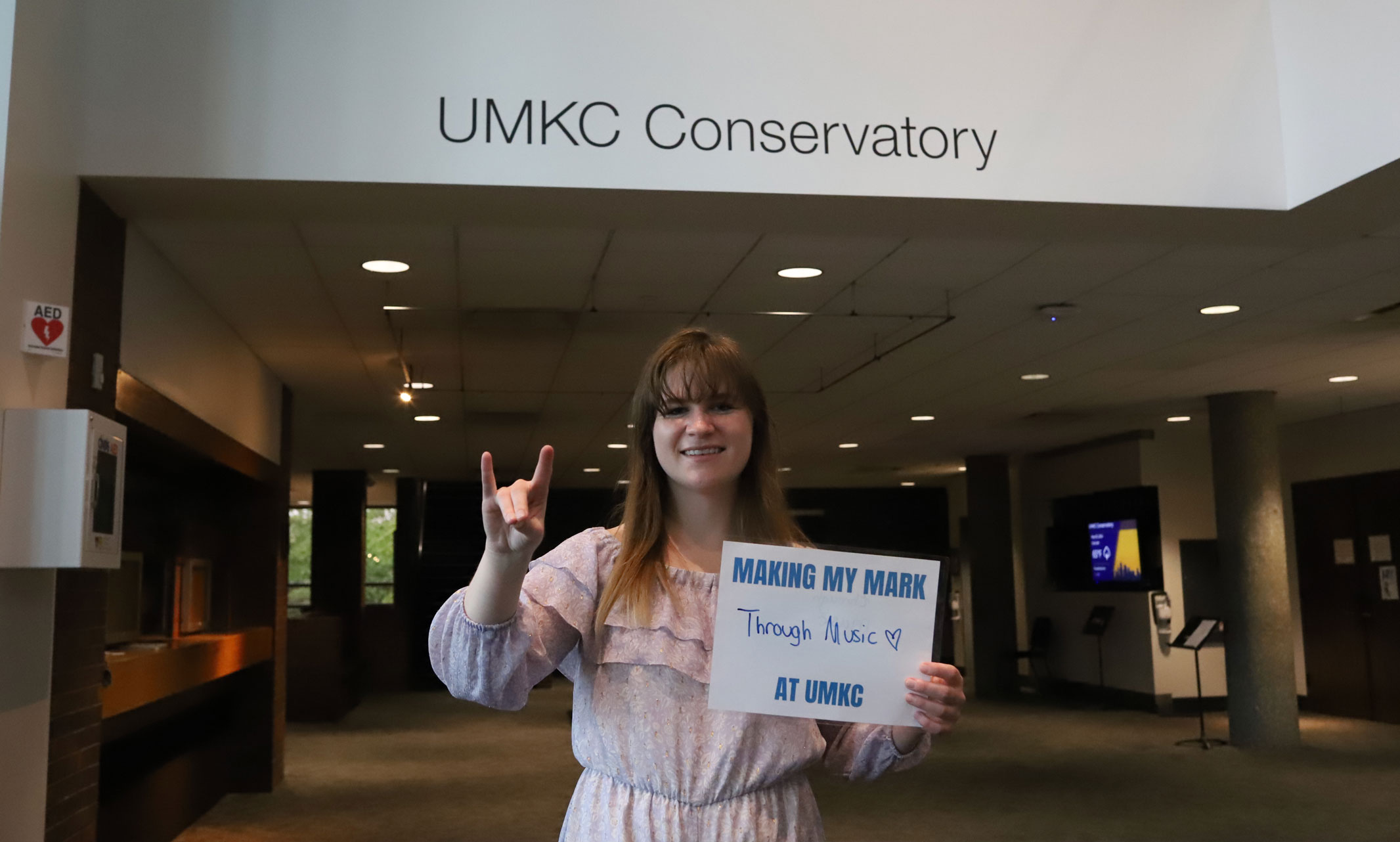
Tori Venske credits UMKC for preparing her for a future of service and leadership
At UMKC, students write their own stories, form their own definitions of success and chart innovative career paths. Tori Venske came to UMKC to further her music, and she left with newfound leadership skills to help her reach her goal of serving in a military band.
Tori Venske
Graduation year: May 2024
UMKC degree program: Master of Music in Clarinet Performance
Hometown: Yukon, OK
From the time she was in high school, Venske knew she wanted to play the clarinet in a military band. Now that she has a Master of Music degree from the UMKC Conservatory and newfound confidence in her abilities, it’s time to make her dreams come true.
Why did you choose your field of study?
I’ve wanted to be a musician since I was a kid. When I was 4, I wanted to be a singer/songwriter. Then I started piano and eventually played clarinet in band. I’ve known since my freshman year of high school in 2014 that I wanted to be a professional clarinetist. I’ve been working hard towards that ever since.
What are the challenges of the program?
With all of the performances and presentations every semester, I’ve had to push myself to be more confident. I was really nervous at first, but the faculty inspired me to think about everything in a musical sense and embrace it.
Balancing everything has been hard, too. My first year here I was in both wind symphony and wind ensemble. It was great to be in band every day of the week, but at the same time trying to balance everything going on was hard at first. I got the hang of it though.
What are the benefits of the program?
The faculty and opportunities to perform and learn are great. I really appreciate the faculty. They’re trying to make me the best musician and person I can be.
I’ve had a lot of opportunities to perform during my time here, which has been rewarding. I went through my undergraduate degree during COVID, so I missed out on a lot of traditional performances. I’ve also had a lot of opportunities to play, learn new instruments and participate in choir. Additionally, the academic resources are great. We’re encouraged to look through the Marr Sound Archives and LaBudde Special Collections to learn more about Kansas City musicians. It’s nice having those right on campus at the library.
How has your college program inspired you?
The faculty are really inspiring, especially professors Steve Davis and Joe Parisi. They’re just really encouraging to me and have helped me be more dedicated in everything I do.
Since entering college, what have you learned about yourself?
I feel like I’ve been able to face challenges better since coming here. It’s always been hard to accept when things are out of my control, even when I know that’s how life is. I’ve been able to work on that and surround myself with people that inspire and encourage me every day.
Who do you admire most at UMKC?
My friend, Beth Christensen, I see everything she does and how well she handles it all. She’s always doing so much, and always with grace and kindness. Just seeing her work every day is inspiring to me.
How does going to school in the middle of a large city enhance your experience and education?
Being in Kansas City is great. I’ve gotten to perform at the Kauffman Center for the Performing Arts and the Folly Theater. The opportunities to see different types of art makes me better at my craft. I love visual art. I’ve been to the Nelson-Atkins Museum of Art and different art festivals around town. I love that so much is free to access. I like finding inspiration in things other than music.
What do you hope to take from your experiences at UMKC into your professional career?
I’ve learned a lot here that I’ve been able to implement. I’ve embraced my confidence and leadership skills during my time here. I want to be in a military band, and those are important qualities to have. I’ll have to audition for that, so those leadership skills are appreciated.
When I decided that I want to do clarinet professionally, military band stood out to me right away. I like the interactions the musicians have with people. Military bands tour around the country and visit schools to teach masterclasses. I think it’s important to have that community engagement. I also like the repertoire they play; they play standard and new pieces. They also play pieces by underrepresented composers, which is important to me. The variety is exciting.
There are a lot of military branches that have openings, I’ll audition throughout summer. If I’m accepted, I’ll have to enlist. Some of the branches also require going to basic training camp. My grandfather and great-grandfather were both in the Navy, so it would be cool to be accepted into the Navy band.
Aug 07, 2024
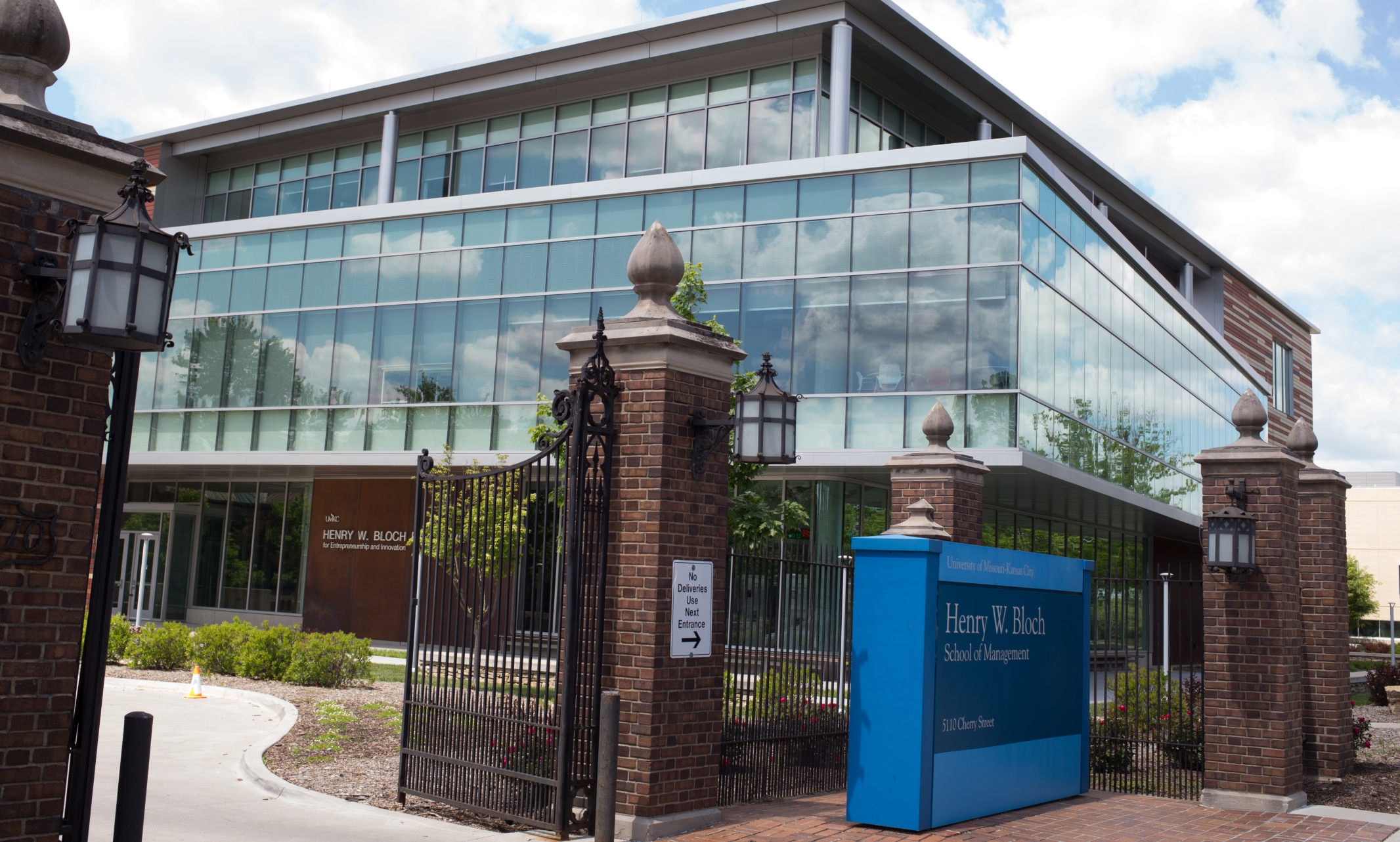
Partnership includes $10,000 scholarship award per student
The University of Missouri-Kansas City Henry W. Bloch School of Management is partnering with five top Kansas City banks to announce a new scholarship program. Banking Leaders of Tomorrow is designed to inspire future professionals to make a difference in their communities as leaders in the banking and finance industries.
Available to incoming students from Missouri or Kansas, this scholarship totals $10,000 over four years for incoming freshmen who express interest in pursuing careers in banking and finance. To provide continued support during their education, accepted students will also receive both academic and professional mentoring as well as networking opportunities.
This scholarship is made possible through generous support and close partnerships with area banks who have committed to supporting students in and out of the traditional classroom through lectures, site visits and panel discussions. They have also committed to providing internship opportunities, ensuring real-world experience throughout these students' time at UMKC.
Academy Bank
Arvest Foundation
Commerce Bank
Lead Bank
UMB Bank
“Banking Leaders of Tomorrow is much more than a scholarship and we could not launch this program without great partners,” said Jocelyn Evans, associate dean of the Bloch School. “These banks are not only committing their time here on campus, but they are also providing important opportunities for our students to explore their future in banking and finance.”
Scholarships will be awarded based upon a student’s essay describing their interest in a financial services career and how their experiences have prepared them to engage in banking relationships with individuals and businesses in low- and moderate-income areas in the Kansas City metropolitan area where many residents do not have traditional banking relationships.
“The Bloch School is committed to educating students who will improve the communities where they will one day live,” said Bloch School Dean Brian Klaas. “Banking Leaders of Tomorrow furthers that commitment, and we’re grateful to our partner banks for making this possible.”
Jul 10, 2024
